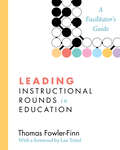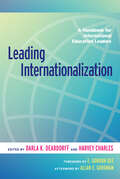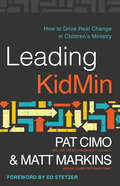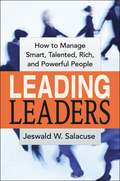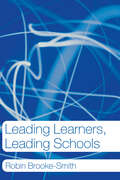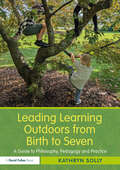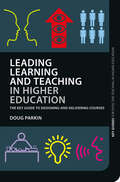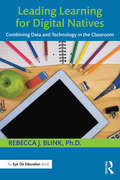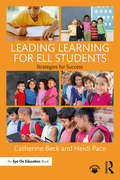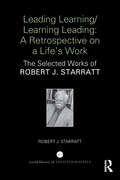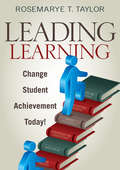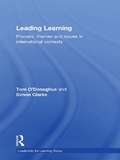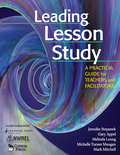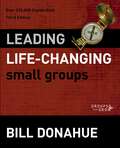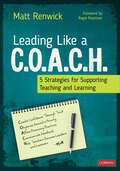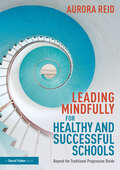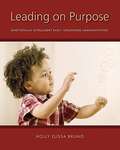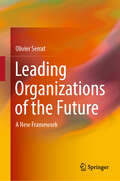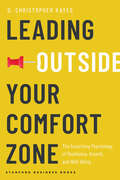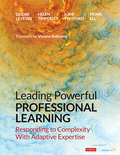- Table View
- List View
Leading Instructional Rounds in Education: A Facilitator’s Guide
by Thomas Fowler-FinnInstructional rounds is a powerful form of professional learning aimed at helping schools and systems develop the capacity to educate all children to high levels. In this practical book, Thomas Fowler-Finn, an experienced consultant who has worked closely with the Harvard team that pioneered instructional rounds, discusses how facilitators can skillfully guide a network of educators through the rounds process. He shows how to scaffold participant learning, model effective teaching practices, and gradually transfer agency to the network. Leading Instructional Rounds is an invaluable resource for advancing the work of all facilitators, whether novice or experienced.
Leading Internationalization: A Handbook for International Education Leaders
by Darla K. Deardorff Harvey CharlesCo-published with What do university leaders need to know and be able to do to internationalize their institutions?This volume provides senior professionals in international education, increasingly known as Senior International Officers (SIOs), with the foundational knowledge that informs leadership practices, together with suggested strategies for implementing and developing the wide range of functions, activities and skills associated with comprehensive internationalization that will ensure effective support for their institutions’ educational mission in today’s globalized and interdependent world.This book addresses strategic leadership issues in internationalization including strategic planning, shaping the curriculum, recruiting students, risk management, and developing partnerships. Throughout, the Association of International Education Administrators’ (AIEA) Standards of Professional Practice for SIOs and International Education Leaders (reproduced in the appendix) are integrated as a point of reference, providing a much needed guide for international education leaders.This resource is a vital starting point for anyone in a senior leadership role in higher education, as well as for anyone desiring to understand more about this key leadership position essential to higher education institutions in developing institutional global capacity and in educating global-ready graduates.
Leading KidMin: How to Drive Real Change in Children's Ministry
by Pat Cimo Matt MarkinsWant to see your church&’s kids transformed for Jesus? Struggling to get the whole church on board? Know what you want to see happen, but not how to make it happen? Leading KidMin is about what it takes to achieve big-time change. Moving past the &“why&” and getting straight to the &“how,&” Leading Kidmin provides tools and strategies for actually leading, influencing, and implementing change on a local church level—all from the vantage point of the children&’s ministry director. The mission of Leading KidMin is to create a movement of change-agents who don&’t just know that change is needed, but are equipped to make it happen, leading their churches in becoming more aligned, effective, and geared for growth.Pat Cimo and Matt Markins, veterans of KidMin, are prepared to make you the change-agent you want to be—and that your church needs you to be. Are you ready?
Leading KidMin: How to Drive Real Change in Children's Ministry
by Pat Cimo Matt MarkinsWant to see your church&’s kids transformed for Jesus? Struggling to get the whole church on board? Know what you want to see happen, but not how to make it happen? Leading KidMin is about what it takes to achieve big-time change. Moving past the &“why&” and getting straight to the &“how,&” Leading Kidmin provides tools and strategies for actually leading, influencing, and implementing change on a local church level—all from the vantage point of the children&’s ministry director. The mission of Leading KidMin is to create a movement of change-agents who don&’t just know that change is needed, but are equipped to make it happen, leading their churches in becoming more aligned, effective, and geared for growth.Pat Cimo and Matt Markins, veterans of KidMin, are prepared to make you the change-agent you want to be—and that your church needs you to be. Are you ready?
Leading Ladies
by Marlee Matlin Doug CooneyMegan's fourth-grade class is putting on their own original musical based on the book The Wizard of Oz, and Megan wants to be the star of the show and play Dorothy. Since she's deaf, she will sign the songs for her audition. However, a problem develops when Lizzie, her best friend from camp, transfers from her all-deaf school to Megan's class - and signs the same two songs that Megan was going to do! Luckily, Megan has some other ideas up her sleeve...
Leading Leaders: How to Manage Smart, Talented, Rich, and Powerful People
by Jeswald SalacuseHow do you leverage the assets of the talented and powerful while making sure that egos remain unbruised? Leading Leaders breaks the challenge down into the Seven Daily Tasks of Leadership, and shows you how to carry out each task when you have to manage other leaders.The leaders you are called upon to lead may be other executives, highly educated experts, investors, board members, government officials, doctors, lawyers, or other professionals. The potential contributions of these elites to any organization are vital, but the likelihood of friction is also high if you don&’t manage relationships carefully. In any case, they are people with significant resources -- and strong opinions.The seven tasks and the special challenges they entail in Leading Leaders are:Direction - How do you negotiate a vision for the organization that other leaders will buy into?Integration - How do you make stars a team?Mediation - How do you resolve conflicts over turf and power among other leaders so the organization can move forward?Education - How do you educate people who think they are already educated?Motivation - How do you move other leaders who already seem &“to have everything&” to do the right thing for the organization?Representation - How do you lead your organization&’s outside constituents while still leading leaders inside?Trust Creation - How do you gain and keep other leaders&’ trust, the vital capital that your own leadership depends on?Drawing on the author&’s own leadership experience as well as his research in the corporate, political, academic, and professional worlds, Leading Leaders answers these questions with a clear set of effective rules for all managers to follow in successfully leading other leaders.
Leading Learners, Leading Schools
by Robin Brooke-SmithIn this book, Robin Brooke-Smith explores the dynamics of schools as complex organisations. He presents a radical departure from established school improvement and effectiveness orthodoxies, offering a refreshing new approach to managing change and enhancing collective learning.Based on the author's own experience of managing and leading schools, this book explores such questions as:* How can schools learn as a generative process?* How can schools become adaptive and co-evolve with their internal and external environments?* How can education leaders 'navigate' their institutions out of the comfort zone and into the creative state?The book concludes with a series of practical lessons for leading schools in complex conditions and will be of great value to reflective, action-orientated heads, principals and deputies, as well as academics and researchers in education management.
Leading Learning Outdoors from Birth to Seven: A Guide to Philosophy, Pedagogy and Practice
by Kathryn SollyThis book reveals how early childhood leaders and practitioners can lead and enhance children’s play, learning and experiences outdoors. It considers all aspects of outdoor provision from the importance of the setting’s vision, routines, boundaries and expectations to the impact of staff and parental attitudes.The book explores the benefits of the outdoor environment for children and how it benefits all areas of learning and development. Covering the role of the adult, the environment and resources at different ages and stages of development, the chapters offer practical guidance on creating high-quality outdoor play experiences for all children throughout the year. Kathryn Solly also addresses common barriers to outdoor learning and highlights the strategies that can be used to champion outdoor learning with colleagues, leaders and managers, and children and their families.Featuring rich case studies and photographs to illustrate good practice, this is essential reading for early years leaders, managers, educators and students.
Leading Learning and Teaching in Higher Education: The key guide to designing and delivering courses (Key Guides for Effective Teaching in Higher Education)
by Doug ParkinLeading Learning and Teaching in Higher Education brings together contemporary ideas on leadership, engagement and student learning into a practical solutions-based resource designed for those undertaking the challenge of leading a university-level teaching module, programme or suite of programmes, particularly through periods of transformation or change. It encourages both first time academic leaders and those who have held teaching leadership roles for some time to review and formalise their development in a systematic, simple way and acts as a framework for navigating the opportunities and challenges involved in inspiring shared purpose, strong commitment and innovation in higher education teaching. With a clear focus on the energy of leadership rather than the practice of management, and with a strong emphasis on collaborative engagement running throughout, this books offers: Insightful guidance which is not bound to subject-specific requirements, making it relevant across the spectrum of course offerings at any one institution. An enabling, people-focussed foundation for leadership. Tools and frameworks which can be readily applied or adapted for the reader. A focus on core elements of teaching leadership, such as design, delivery, assessment and building a programme team. A flexible and pragmatic approach to leadership which avoids a definitive approach, instead encouraging a dynamic method of engaging leadership. Values that assert that leadership and learning go hand-in-hand. A wide-ranging discussion of leadership theories, ideas and values related to the university context. This book puts forward a multifaceted model of programme leadership and links this to a scaffolding of key attributes, skills and qualities that fit the environment of leading learning and teaching in the university. Particularly interested readers will be those beginning to lead teaching in a university setting as well as those who have been leading programme teams and the wider provision of teaching for some time wanting to enhance their skills and perspective.
Leading Learning for Digital Natives: Combining Data and Technology in the Classroom
by Rebecca J. BlinkIn light of rapid advances in technology and changes in students’ learning styles, Leading Learning for Digital Natives offers much-needed new tools for guiding effective instruction in the classroom. By offering practical strategies for gathering data with technology tools, this book helps school leaders embrace data and technology to develop the classroom and instructional practices that students need today. Blink’s practical and accessible tips make it easy for teachers and leaders to use technology and data to engage students and increase student achievement. Focusing coverage on the latest technology tools, this book will help you lead a school that personalizes instruction and learning through: Integration of data Real-time instruction Setting expectations and outcomes to align with new state standards Integration of technology tools and blended pedagogy
Leading Learning for ELL Students: Strategies for Success
by Catherine Beck Heidi PaceGrounded in current research and award-winning practice, this important book provides a blueprint for school leaders to successfully implement programs and policies for creating an equitable learning environment for English Language Learners (ELLs). Full of accessible examples, strategies, checklists and solutions, this book covers topics such as elementary and secondary home visitation, family literacy programs, first-generation college attendance, family-school partnerships, second-language instruction, culturally responsive teaching and professional development. The guidance provided in Leading Learning for ELL Students can be put into practice immediately, and will help leaders at all levels address the changing landscape of their student populations to ensure the success of all students.
Leading Learning/Learning Leading: The selected works of Robert J. Starratt
by Robert J StarrattInternationally recognized for his writing on educational leadership, and the ethics of educational leadership, Robert J. Starratt brings together a thoughtfully crafted selection of his writing, representing key aspects of his life and work, leading to his current thinking on the convergence of school leadership, the professional ethics of educators, and the integrity of the teaching-learning process. This retrospective reveals Starratt's enduring work as probing the foundational intelligibility of the teaching-learning process and its connection to human development of both students and teachers. It exhibits his efforts to focus the leadership of the teaching-learning process on a combination of cognitive insight into the intelligibility of the world, affective dwelling in the particulars of that intelligibility, and the responsibilities one’s relationships with the particular might suggest. A new introduction contextualises Starratt's work against key developments in the field. The unique collection of chapters develop various themes, from human resource development to the complexity of curriculum change and from ethical analysis of school organizational structures to the complex dramas in students’ personal lives and in the classroom. The book chronicles Starratt’s contributions to the field and his role as a leading scholar, who has played a key part in the development of leadership and ethics in education over the course of his career. Leading Learning/Learning Leading will be of global interest to education leaders and researchers engaged in the field of educational leadership and ethical education.
Leading Learning: Change Student Achievement Today!
by Rosemarye T. TaylorFeaturing real-world examples, practical strategies, and interviews with successful leaders, this resource helps educational leaders implement actions that drive second-order change and increase student achievement!
Leading Learning: Process, Themes and Issues in International Contexts (Leadership for Learning Series)
by Simon Clarke Tom O'DonoghueThe study of educational leadership makes little sense unless it is in relation to who the leaders are, how they are leading, what is being led, and with what effect. Based on the premise that learning is at the heart of leadership and that leaders themselves should be learners, the Leadership for Learning series explores the connections between educational leadership, policy, curriculum, human resources and accountability. Each book in the series approaches its subject matter through a three-fold structure of process, themes and impact. Series Editors - Clive Dimmock, Mark Brundrett and Les Bell The notion that school transformation is dependent on exceptional leaders is increasingly seen as unrealistic and unsustainable. Instead, the idea of distributed leadership, which promotes the view that all stakeholders have complementary leadership roles to play in enhancing student learning, is now being promoted as a more useful framework for understanding schools and how they might be changed. Subscribing to the notion of distributed leadership, O’Donoghue and Clarke identify two key groups: the ‘leaders of learning’ and the ‘leaders for learning’. The leaders of learning – and the focus of this book – are those working at the school level to improve the quality of learning in the classroom, such as teachers, principals, pupils and involved members of the local school community. The leaders for learning are the policy-makers and administrators whose support is crucial. The authors argue that in order to be effective leaders, both groups require an understanding of: Broad trends in contemporary leadership theory Recent views on learning theory The importance of teachers engaging continually in learning about their practice The significance of creating and sustaining schools as learning organisations Forging links between leadership and learning The book’s examination of the shifting approaches to leading learning in contemporary schools is enriched by innovative examples drawn from a range of international contexts. Leading Learning will appeal to students involved in masters and doctoral courses relevant to the field and those undertaking programmes of school leadership preparation and development. It will also be of interest to academics working in the field of educational leadership and management.
Leading Lesson Study: A Practical Guide for Teachers and Facilitators
by Mark Mitchell Jennifer Stepanek Gary Appel Melinda Leong Michelle Turner ManganUse this team-centered approach to directly enhance teaching and learning in your school! First introduced in Japan, lesson study has gained enthusiastic advocates in US educational circles as a powerful, collaborative approach. This "how-to" guide leads a beginning team through the lesson study cycle and provides an experienced team with new perspectives. Using examples from U.S. classrooms, this handbook: Encourages educators to generate and share knowledge Inspires a teacherresearcher stance Illustrates both the process and substance of lesson study Encourages collaboration Provides guidelines for avoiding common pitfalls
Leading Life-Changing Small Groups (Groups that Grow)
by Bill DonahueLike nothing else, small groups have the power to change lives. They are the ideal route to discipleship—a place where the rubber of biblical truth meets the road of human relationships. However, church leaders often feel at a loss when it comes to assessing the strengths and weaknesses of group life in a church, and they struggle with understanding and solving the root causes of problems. Group Life resources provide in ebook format the practical tools and training resources needed to develop life-changing small group leaders, coaches to shepherd group leaders, and ultimately, a thriving church-wide small group ministry. These resources include the updated and revised versions of the best-selling Leading Life-Changing Small Groups and Coaching Life-Changing Small Group Leaders, the new Building a Life-Changing Small Group Ministry and the supplemental Group Life Training DVD. Appropriate for individual or group study, the books function as manuals and workbooks that teach and allow readers to process and record information as they learn. Downloadable web-based vision clips and supplemental videos in the DVD help readers explore and discuss topics further. Group Life Resources conveniently integrate with the ReGroupTM curriculum, giving trainers the option to use them together. The updated and revised third edition of Bill Donahue’s best-selling Leading Life-Changing Small Groups will help church leaders prepare small group leaders who can successfully facilitate gatherings and shepherd group participants.
Leading Like a C.O.A.C.H.: 5 Strategies for Supporting Teaching and Learning
by Matt RenwickExpand your leadership capacity to help your school reach its potential All schools have the capacity for schoolwide instructional excellence. Schools with leaders who adopt a coaching stance as part of their practice are more likely to realize this success. Leaders achieve success with their teachers, their students, and their families, not alone. Leading like a C.O.A.C.H. reframes the approach to schoolwide change from a leader acting alone to a leader working with a community in which each member contributes their strengths and ideas to improving instruction. Renwick, a well-known blogger and writer on literacy and leadership, encourages school leaders to embody five practices: 1. Create confidence through trust; 2. Organize around a priority; 3. Affirm promising practices; 4. Communicate feedback; and 5. Help teachers become leaders and learners. Throughout this practical guide, readers will find Reflective questions Activities Indicators of success Examples of leaders coaching teachers to excellence Wisdom from the field This book provides new and veteran leaders with a practical approach and easily adoptable ideas for helping their schools realize their full potential.
Leading Like a C.O.A.C.H.: 5 Strategies for Supporting Teaching and Learning
by Matt RenwickExpand your leadership capacity to help your school reach its potential All schools have the capacity for schoolwide instructional excellence. Schools with leaders who adopt a coaching stance as part of their practice are more likely to realize this success. Leaders achieve success with their teachers, their students, and their families, not alone. Leading like a C.O.A.C.H. reframes the approach to schoolwide change from a leader acting alone to a leader working with a community in which each member contributes their strengths and ideas to improving instruction. Renwick, a well-known blogger and writer on literacy and leadership, encourages school leaders to embody five practices: 1. Create confidence through trust; 2. Organize around a priority; 3. Affirm promising practices; 4. Communicate feedback; and 5. Help teachers become leaders and learners. Throughout this practical guide, readers will find Reflective questions Activities Indicators of success Examples of leaders coaching teachers to excellence Wisdom from the field This book provides new and veteran leaders with a practical approach and easily adoptable ideas for helping their schools realize their full potential.
Leading Mindfully for Healthy and Successful Schools: Beyond the Traditional Progressive Divide
by Aurora ReidSchools are increasingly expected to improve mental health and well-being and academic outcomes for students. However, the debate about well-being and school improvement is often unhelpfully polarised with attachment-informed and restorative-justice approaches pitted against structures and systems that instil discipline. This book seeks to take a ‘middle way’, looking at how these perspectives might complement one another, and argues that healthy teacher-student relationships require an adult that is both attuned to their students’ needs and able to hold boundaries with them. Setting out conception of leadership that is clear, compassionate, and self-aware, Leading Mindfully for Healthy and Successful Schools draws on therapeutic and educational research to identify key strategies for improving well-being across schools that are sustainable in the long term. This book is divided into three sections – Leading Yourself, Leading School Culture and Leading in the Classroom – and the chapters cover the following: Interpersonal neurobiology and the role that attachment plays in our work Self-care and how this can be built into school life The role of structures and relationships Building trust Radical inclusion Building calm and effective classrooms Healthy adult authority Including reflective activities, thought-provoking case studies and key takeaways for every chapter, this is an essential read for all current and aspiring school leaders.
Leading On Purpose: Emotionally Intelligent Early Childhood Administration
by Holly BrunoEven if a student learns all the facts and figures about early childhood administration, he or she cannot hope to lead without understanding how to build dynamic relationships with staff, families, and community. Leading on Purpose: Emotionally Intelligent Early Childhood Administration is the first textbook based in fascinating hot-off-the-presses relational Emotional Intelligence theory. Bruno skillfully uses neuroscience (brain research on relationships) to breathe life into previously dry topics like regulatory legislation, facilities management and budgeting. Laying substantive EQ groundwork in the first two chapters, the author infuses every chapter that follows, from “Creating a community of problem solvers: winners not whiners” to “Quest for quality: licensing, accreditation and codes of ethics” with vibrantly engaging authentic case studies. Leading on Purpose is a text students will WANT to read. Are you ready?
Leading Organizations of the Future: A New Framework
by Olivier SerratThis book delves into uncharted territory, offering an extensive exploration of the future of organizations and how they should be led. In a world characterized by volatility, uncertainty, complexity, and ambiguity (VUCA), traditional organizational paradigms no longer suffice. Instead, this book introduces a visionary framework for the leadership of tomorrow's organizations, one that adapts to the unique demands of each situation.Drawing on insights from interviews with 12 subject matter experts, this research-driven work challenges the relevance of twentieth-century leadership styles in the VUCA era. The experts highlight the importance of metagovernance, complexity leadership, and sense-making as essential components of navigating the ever-evolving landscape of modern organizations.Central to this exploration is the question of how to develop a context-specific leadership management framework capable of guiding organizations through simple, complicated, complex, and chaotic contexts. This book not only identifies the pressing need for such a framework but also provides a comprehensive blueprint for its creation.This book is a valuable resource for those who wish to understand the future of organizational leadership and how it can adapt to the challenges and opportunities of the twenty-first century. It not only reshapes the current understanding of leadership but also offers practical insights that will shape the organizations of the future.
Leading Outside Your Comfort Zone: The Surprising Psychology of Resilience, Growth, and Well-Being
by D. Christopher KayesA research-backed guide to leading with confidence and resilience in an age of anxiety. Leading is inevitably frustrating and emotionally demanding, yet leaders get little training in how to deal with painful emotions. Since the global pandemic, stresses on leaders have only grown. To lead effectively in an age of anxiety, leaders must build the capacity to act in spite of unpleasant emotions, and bring a learning mindset to challenges that can otherwise feel overwhelming. Leading Outside Your Comfort Zone draws on a wide body of research to show how well-being and resilience emerges from this struggle; leaders grow by adopting a learning mindset in the face of unpleasant emotions. The book explains how to: - Confidently face new challenges - Accelerate progress toward goals - Improve productivity during discouraging, "unfruitful" periods - Overcome frustration with difficult personalities and organizational politics - Build confidence and a mindset of stress-less productivity - Build resilience throughout the organization Leadership expert D. Christopher Kayes integrates insights from diverse disciplines, including management and organization studies, psychology, sports and military psychology, neuroscience, and education, and presents original research involving over 1,000 leaders. The book focuses on five tools that help leaders develop positive emotional engagement, creative problem-solving, learning identity, flexibility, and social support.
Leading Powerful Professional Learning: Responding to Complexity With Adaptive Expertise
by Dr. Deidre M. Le Fevre Professor Helen S. Timperley Dr. Fiona R. Ell Dr. Kaye TwyfordYou are central to effective professional learning! For professional learning to have a meaningful impact, it needs to be sustained, collaborative, evidence-informed, and student focused—generating multifaceted solutions to real-life issues. Gone are the one-size-fits-all answers—instead, you’ll use your knowledge and expertise to lead your PLC in actively solving complex problems. This book, based on the results of a five-year research study, provides: • An innovative approach to the design and delivery of professional learning grounded in principles of adaptive expertise • Easy-to-use one-page summaries of “Deliberate Acts of Facilitation” • Guidance that’s fully congruent with Learning Forward Standards for Professional Learning
Leading Powerful Professional Learning: Responding to Complexity With Adaptive Expertise
by Dr. Deidre M. Le Fevre Professor Helen S. Timperley Dr. Fiona R. Ell Dr. Kaye TwyfordYou are central to effective professional learning! For professional learning to have a meaningful impact, it needs to be sustained, collaborative, evidence-informed, and student focused—generating multifaceted solutions to real-life issues. Gone are the one-size-fits-all answers—instead, you’ll use your knowledge and expertise to lead your PLC in actively solving complex problems. This book, based on the results of a five-year research study, provides: • An innovative approach to the design and delivery of professional learning grounded in principles of adaptive expertise • Easy-to-use one-page summaries of “Deliberate Acts of Facilitation” • Guidance that’s fully congruent with Learning Forward Standards for Professional Learning
Leading Practice in Early Years Settings
by Mary E. WhalleyTo achieve Early Years Professional Status candidates must demonstrate that they have effectively led the professional practice of their colleagues across the 0-5 age range. The second edition of this popular text helps Early Years students and experienced practitioners develop the knowledge, skills and confidence to do just that. It explains the nature of leadership and the EYP's role in promoting good practice and appropriate values and principles. This new edition has been fully revised and updated and includes new chapters on leading practice in a multi-professional context and the leader of practice as an agent of change.
